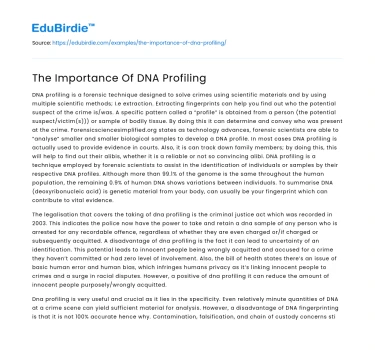DNA profiling is a forensic technique designed to solve crimes using scientific materials and by using multiple scientific methods; I.e extraction. Extracting fingerprints can help you find out who the potential suspect of the crime is/was. A specific pattern called a “profile” is obtained from a person (the potential suspect/victim(s))) or sample of bodily tissue. By doing this it can determine and convey who was present at the crime. Forensicsciencesimplified.org states as technology advances, forensic scientists are able to “analyse” smaller and smaller biological samples to develop a DNA profile. In most cases DNA profiling is actually used to provide evidence in courts. Also, it is can track down family members; by doing this, this will help to find out their alibis, whether it is a reliable or not so convincing alibi. DNA profiling is a technique employed by forensic scientists to assist in the identification of individuals or samples by their respective DNA profiles. Although more than 99.1% of the genome is the same throughout the human population, the remaining 0.9% of human DNA shows variations between individuals. To summarise DNA (deoxyribonucleic acid) is genetic material from your body, can usually be your fingerprint which can contribute to vital evidence.
The legalisation that covers the taking of dna profiling is the criminal justice act which was recorded in 2003. This indicates the police now have the power to take and retain a dna sample of any person who is arrested for any recordable offence, regardless of whether they are even charged or/if charged or subsequently acquitted. A disadvantage of dna profiling is the fact it can lead to uncertainty of an identification. This potential leads to innocent people being wrongly acquitted and accused for a crime they haven’t committed or had zero level of involvement. Also, the bill of health states there’s an issue of basic human error and human bias, which infringes humans privacy as it’s linking innocent people to crimes and a surge in racial disputes. However, a positive of dna profiling it can reduce the amount of innocent people purposely/wrongly acquitted.
Save your time!
We can take care of your essay
- Proper editing and formatting
- Free revision, title page, and bibliography
- Flexible prices and money-back guarantee
Dna profiling is very useful and crucial as it lies in the specificity. Even relatively minute quantities of DNA at a crime scene can yield sufficient material for analysis. However, a disadvantage of DNA fingerprinting is that it is not 100% accurate hence why. Contamination, falsification, and chain of custody concerns still exist with this technology.
Did you like this example?
Make sure you submit a unique essay
Our writers will provide you with an essay sample written from scratch: any topic, any deadline, any instructions.
Cite this paper
-
APA
-
MLA
-
Harvard
-
Vancouver
The Importance Of DNA Profiling.
(2022, February 17). Edubirdie. Retrieved December 22, 2024, from https://edubirdie.com/examples/the-importance-of-dna-profiling/
“The Importance Of DNA Profiling.” Edubirdie, 17 Feb. 2022, edubirdie.com/examples/the-importance-of-dna-profiling/
The Importance Of DNA Profiling. [online].
Available at: <https://edubirdie.com/examples/the-importance-of-dna-profiling/> [Accessed 22 Dec. 2024].
The Importance Of DNA Profiling [Internet]. Edubirdie.
2022 Feb 17 [cited 2024 Dec 22].
Available from: https://edubirdie.com/examples/the-importance-of-dna-profiling/
copy






 Stuck on your essay?
Stuck on your essay?

